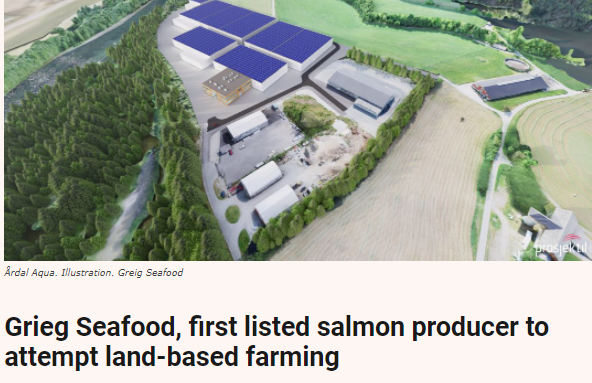 Norska sjókvíaeldisfyrirtækið Grieg Seafood sendi frá sér í gær tilkynningu til kauphallarinnar í Ósló þar sem sagt er frá þátttöku félagsins í byggingu landeldisstöðvar í Rogalandi í Noregi.
Norska sjókvíaeldisfyrirtækið Grieg Seafood sendi frá sér í gær tilkynningu til kauphallarinnar í Ósló þar sem sagt er frá þátttöku félagsins í byggingu landeldisstöðvar í Rogalandi í Noregi.
„Við erum að vinna ötullega í því að bæta líffræðilegt umhverfi og velferð fiskanna og draga úr umhverfisáhrifum okkar,“ sagði Andreas Kvame, forstjóri Grieg Seafood, sem er fyrsta félagið af norsku sjókvíaeldisrisunum til að taka afgerandi skref í fulleldi á laxi á landi, en öll reka þau þar umfangsmikið seiðaeldi.
Hér á Íslandi er raunveruleg hætta á að við munum sitja uppi með opið sjókvíaeldi til langrar framtíðar á sama tíma og verið er að fjárfesta í öðrum löndum í tækni sem lágmarkar umhverfisáhrif starfseminnar.
sjá umfjöllun Salmon Business.
„3,000 tonnes on the horizon. Årdal Aqua is owned one third by Grieg Seafood, one third by the smolt and post-smolt company Vest Havbruk and one third by the investor group Omfar.
In a press release on the Oslo Stock Exchange, Grieg Seafood writes that its joint venture Årdal Aqua will produce at least 3,000 tonnes of post-smolt annually and grow fish all the way to harvest size in a new land-based facility in Rogaland, Southern Norway. Grieg Seafood owns one-third of the company.
Important part of the solution
“We are working hard to improve biology and fish welfare, and to reduce our impact. For a long time, we have invested in post-smolt, where we keep the fish longer on land before we release it into the sea, as an important part of the solution. With Årdal Aqua we will be able to develop this farming method further. We aim for all of our fish in Rogaland to spend less than one year in the sea,” said Andreas Kvame, CEO of Grieg Seafood and Chair of Årdal Aqua.
The project is currently in the design development phase, and the company aims to start construction during the autumn of 2021. The facility will be built in Årdal in Rogaland, and has a production capacity of 5,000 tonnes annually according to current plans. The company aims to increase the production capacity further.
3,000 tonnes
In addition, the company aims to gradually produce fish to harvest size on land.
“Through our post-smolt investments, we acquire competence on how to produce larger fish on land. Based on this knowledge, Årdal Aqua will also grow fish all the way to harvest size. We will take a step-by-step approach, as we know how complex biology is,” Kvame added.
The Grieg Seafood CEO said he is convinced that different farming technologies and methods will complement each other in the future.
Sea-based farming
“With continuous improvements that reduce the impact from our sea farms, something we work a lot on, farming in the seas will still be the main component of the industry going forward. Land-based farming is, however, a great supplement, and we look forward to taking part in the development of this technology. What we know for sure is that the world will need a lot more healthy and nutritious food with the lowest possible impact,” said Kvame.
Årdal Aqua is owned one third by Grieg Seafood, one third by the smolt and post-smolt company Vest Havbruk and one third by the Stavanger-based investor group Omfar.
The company will release information about the investment cost when the design development phase is completed. It estimates an investment cost of 120 NOK/kg (EUR 11.6/kg).“
